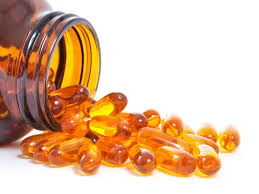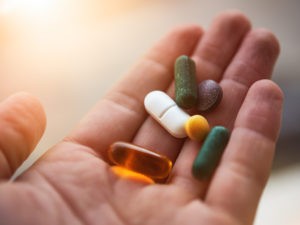
Diagnosed with Cancer? Your two greatest challenges are understanding cancer and understanding possible side effects from chemo and radiation. Knowledge is Power!
Learn about conventional, complementary, and integrative therapies.
Dealing with treatment side effects? Learn about evidence-based therapies to alleviate your symptoms.
Click the orange button to the right to learn more.
Vitamin D Therapy for health, happiness-

Vitamin D Therapy- study after study cites the health benefits that come from supplementing with vitamin D. Further, years of experience have taught me that vitamin D therapy is both:
- inexpensive-
- easy to do-
But many studies simply promote “vitamin D supplementation” or “daily vitamin D supplementation.” Most studies don’t say how much vitamin D to dose, when to take it, much less anything specific that might help the layman or newly diagnosed cancer patient.
I am a long-term cancer survivor. I came across studies about my cancer, multiple myeloma, and the benefits oof vitamin D, years ago. Vitamin D supplementation has been shown to reduce the risk of many different cancers, enhance bone health, reduce the risk of Alzheimer’s Disease and more.
I have learned through experience that newly diagnosed cancer patients need specifics when it comes to any and all therapies.
Here is what the newly diagnosed cancer patient should do in order to derive the greatest benefits from vitamin D therapy.
Have your blood tested- the level of vitamin D checked. Why do this? Vitamin D obtained from sun exposure, foods, and supplements is biologically inert and must undergo two hydroxylations in the body for activation. The first hydroxylation, which occurs in the liver, converts vitamin D to 25-hydroxyvitamin D [25(OH)D], also known as calcidiol. The second hydroxylation occurs primarily in the kidney and forms the physiologically active 1,25-dihydroxyvitamin D [1,25(OH)2D], also known as calcitriol [1].
The point is vitamin D is not about how much you take but your blood levels of vitamin D. I live in Cleveland, Ohio. I do not get much sun exposure. So my blood levels of vitamin D will be different than the person living in California or Florida, for instance.
I have my blood tested through Life Extension Foundations Blood Testing. I go to a local drugstore and the technician at the store draws my blood, sends it in and I get the results via email shortly thereafter.
When I first had my blood tested, my vitamin d levels were less than 20 ng/ml. This was not good. I take 1000 iu x 2 daily and my blood levels are between 30-40 ng/ml. I am happy with that levels. I don’t mega dose.
Many experts recommend a level between 20 and 40 ng/mL. Others recommend a level between 30 and 50 ng/mL. The examples above are common measurements for results of these tests.
What are the health benefits of vitamin D Therapy?
While I’m on the issue of nutritional supplementation, I will also say that I supplement with several other nutrients like vitamin D that have been shown to enhance my health. Examples are:
- magnesium,
- CoQ10
- curcumin,
- resveratrol,
- omega-3 fatty acids
and several other supplements in addition to eating nutritionally (mostly the Mediterranean diet).
My philosophy on supplementation is that I need to supplement my nutritional intake of certain things that research as been shown to support my health. Vitamin D therapy is just one focus of many.
Have you been recently diagnosed with cancer? To learn more about nutritional supplementation and your health, let me know- David.PeopleBeatingCancer@gmail.com.
Thanks,
David Emerson
- Cancer Survivor
- Cancer Coach
- Director PeopleBeatingCancer
Game Changer’ Data for Vitamin D in Digestive Tract Cancers
“Vitamin D supplementation significantly reduced the risk of relapse or death in a subgroup of patients with digestive tract cancer who were p53-immunoreactive, a recent analysis found.
In the p53-immunoreactive subgroup, daily vitamin D supplementation reduced the risk of relapse or death by 73%. Overall, the 5-year relapse-free survival (RFS) among those receiving vitamin D was 81% vs nearly 31% in the placebo group…
A growing body of research suggests that vitamin D supplementation may reduce the risk of cancer mortality, but the evidence remains mixed and efficacy may hinge on a patient’s tumor biology,..
A 2019 randomized controlled trial from the research team found vitamin D supplements of 2000 IU/day did not improve RFS at 5 years in patients with digestive tract cancers. However, a post hoc analysis of the AMATERASU trial, published in 2020, suggested that vitamin D supplementation improved RFS in a subgroup of patients with p53-positive digestive tract cancers, as seen using immunohistochemistry (IHC) staining (79% vs 57% in the placebo group; hazard ratio [HR], 0.52; P = .02)…
In the trial, patients with stage I-III luminal gastrointestinal cancer who had undergone complete tumor resection were randomly assigned to receive placebo or oral vitamin D supplements of 2000 IU/day from their first postoperative visit through the end of the trial, up to 8 years…
The 5-year RFS was significantly higher in the vitamin D group than the placebo group
The main findings of this study were that daily supplementation of 2000 IU of vitamin D reduced the risk of relapse or death compared with placebo in the p53-immunoreactive subgroup,…


